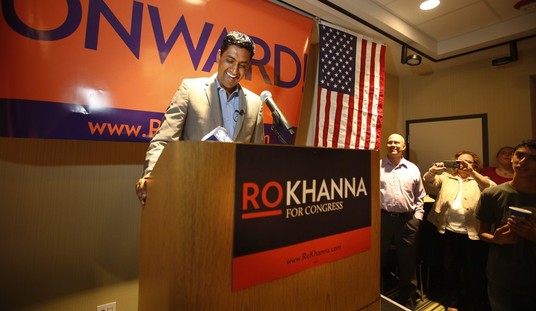It was posted in headlines 12 hours ago and everyone’s heard about it by now but it wouldn’t seem right to let a page one like this pass without mention on the blog, so here you go. Cross your fingers and dive in. It’s a pastiche of anecdotal evidence about security returning to the city to match the statistical evidence that’s been accumulating over the last month, starting with a woman whose family has taken the bold step of returning to Dora — the same neighborhood where St. John’s Church, recently made famous by Michael Yon, is located. The locals there told Yon they wanted their Christian neighbors to come home; the woman interviewed by the Times is Shiite but her experience seems emblematic. The ending of the article captures the fact of improvement but also the relativity of it:
Mrs. Aasan said she was thrilled and relieved just a few days ago, when her college-aged son got stuck at work after dark and his father managed to pick him up and drive home without being killed.
“Before, when we lived in Dora, after 4 p.m., I wouldn’t let anyone out of the house,” she said.
“They drove back to Dora at 8!” she added, glancing at her husband, who beamed, chest out, like a mountaineer who had scaled Mount Everest. “We really felt that it was a big difference.”
If you only have time for one Iraq article this morning, skip the Times and read Rod Nordland’s account of his return to Baghdad in Newsweek. It’s along the same lines as the Times’s — incredulously optimistic, but with appropriate caveats — yet even more detailed about the creep of normalcy. A taste:
Al Qaeda in Iraq is starting to look like a spent force, especially in Baghdad. The civil war is in the midst of a huge, though nervous, pause. Most Shiite militias are honoring a truce. Iran appears to have stopped shipping deadly arms to Iraqi militants. The indigenous Sunni insurgency has declared for the Americans across broad swaths of the country, especially in the capital.
Emerging from our bunkers into the Red Zone, I see the results everywhere. Throughout Baghdad, shops and street markets are open late again, taking advantage of the fine November weather. Parks are crowded with strollers, and kids play soccer on the streets. Traffic has resumed its customary epic snarl. The Baghdad Zoo is open, and caretakers have even managed to bring in two lionesses to replace the menagerie that escaped in the early days of the war (and was hunted down by U.S. soldiers). The nearby Funfair in Zawra Park—where insurgents used to set up mortar tubes to rocket government ministries, and where a car bombing killed four and wounded 25 on Oct. 15—is back in business…
People who have long lived like fugitives can now do the most normal things. Zuhair Humadi, a high-ranking Iraqi official who lives in the Green Zone, recently attended a public wedding celebration in Baghdad without a massive security detail. The Shorja bazaar in old Baghdad, hit by at least six different car bombs killing hundreds in the last year, is again crowded with people among the narrow tented stalls. On nearby Al Rasheed Street, the famous booksellers are back in business, after being driven into hiding by assassins and bombs. People are buying alcohol again—as they always had in Baghdad, until religious extremists forced many neighborhood liquor shops to close.
The caveat is what happens as the surge winds down and the American buffer between the newly segregated Sunni and Shiite neighborhoods evaporates. I wrote a few days ago about the pressure being brought on Maliki to cement the new sectarian accommodation by drawing more Sunnis into the security forces and putting them on the state payroll. Newsweek adds to that a detail about how much the U.S. has paid so far to secure the cooperation of more than 67,000 Sunni tribesmen: $17 million, or less than the cost of one Apache helicopter. Conservative bloggers tend to view Arab violence against Americans perpetually through the prism of religious jihad (for good and understandable reasons), but the more you read about Iraq — including/especially the writings of certain embeds who were ahead of the curve on this — the more you see how much criminal motives complicate the picture. Bill called the insurgency in Anbar a “mafia” operation in August, and today WaPo confirms:
U.S. military commanders say that insurgents across the country are increasingly motivated more by money than ideology and that a growing number of insurgent cells, struggling to pay recruits, are turning to gangster-style racketeering operations.
U.S. military officials have responded by launching a major campaign to disrupt al-Qaeda in Iraq’s financial networks and spread propaganda that portrays its leaders as greedy thugs, an effort the officials describe as a key factor in their recent success beating down the insurgency.
“I tell a lot of my soldiers: A good way to prepare for operations in Iraq is to watch the sixth season of ‘The Sopranos,’ ” said Maj. Gen. Rick Lynch…
“If what they are truly migrating into is money, money, money,” [Lt. Col. Eric Welsh] said, “then that means they are disenfranchised from what al-Qaeda stands for. What you end up getting is al-Qaeda being ineffective and diluted and being almost something else.”
They’re trying to publicize that mafia aspect for propaganda reasons now since Iraqi Muslims are much less likely to cotton to fanatics fighting for graft than for jihad. A shrewd move, since this phenomenon is by no means relegated to Sunnis: Remember the Times story from a few weeks ago about young Mahdi Army recruits starting to alienate Shiites by resorting to petty crimes and teenage gang behavior? A PR campaign against predators and extortionists will bite them, too. SCIRI, always a bit smarter and smoother than the oafish Sadr, is already way ahead of the game in the south.
Here’s the Memeorandum item on the Times story, incidentally. Of the few on the left who have dared to touch it, I count one who’s not sneeringly dismissive.
Update: Captain Ed makes the case that Keller and co. should man up and eat a little shinola here after dismissing Petraeus’s testimony in September. I think Tom Maguire‘s right, though: the thrust of the “empty calories” editorial was that (a) if there is progress, it’s owed more to Iraqis than to Bush’s strategy (“Even if the so-called surge has created breathing room, Iraq’s sectarian leaders show neither the ability nor the intent to take advantage of it.”) and (b) without political reconciliation the surge hasn’t accomplished its task, a point even Petraeus would probably concede.
As for what the Times thinks about Iraq these days, it’s exactly what you’d expect.
More (Bryan): I touched on the influence of organized crime in Iraq in a post shortly after Michelle and I came back from Baghdad. And CPT Aaron Kaufman talked about the progress in Adamiya, which was one of the worst parts of Baghdad when we were there, when I interviewed him from Germany last week.








Join the conversation as a VIP Member